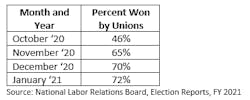Biden’s Labor Agenda: More Employer Scrutiny, More Organizing
Opinion/Analysis
Since enactment of the National Labor Relations Act in 1935, developing labor law has changed—almost without exception—as the political winds of the presidency and Congress have changed. It will be no different with the change from President Trump to President Biden and his administration, and with the current Congress.
Unlike the federal judiciary, labor and employment regulatory appointments change at the end of their respective appointment terms. They include appointments to the National Labor Relations Board, to the Board’s General Counsel, and to other regulatory agencies.
The president, therefore, can change the makeup of the Board and the General Counsel and other regulatory agencies.
In the case of the federal judiciary, its interpretation of the law and how it develops occurs more gradually, and for the most part, is relatively uninfluenced by the vagaries of politics. The National Labor Relations Board, on the other hand, can experience some dramatic shifts in the interpretation of the Act and its developing labor law. So, what should we expect for at least the next four years?
An Important Change at the Top
One remarkable action of President Biden was the termination of the NLRB General Counsel appointment by President Trump. In the past, presidents have waited for the end of the GC’s term of office to make the change.
This is an important change because the GC decides which cases are prosecuted and which are not. Therefore, terminating the GC will change which cases are prosecuted and hence what developing labor law will be.
Since the Board also has rulemaking authority, it is likely that rules governing organizing, collective bargaining and other worker protections will.
The members of the NLRB, like the GC, determine the developing labor law because of their judgments. In both the case of the GC and the Board, the implications for the labor policy of the U.S. are great and often are characterized as a “flip-flop”.
Let’s highlight some of the changes (or potential for “flip-flop”) for at least the next four years.
How Does the Majority of the NLRB Change?
A full board has five members. The majority of the NLRB members under the Trump administration were Republicans, and under the Biden administration the NLRB will most likely begin to turn Democratic as member’s terms expire. Here is the Biden Board as it exists today:
President Biden has already appointed Lauren McFerran as Board Chair. As early as the Summer of 2021, President Biden will be able to attain a majority of the Board seats with Democratic Party affiliation.
How Will a Biden NLRB Impact Organizing?
Since 2015, unions have been winning significantly more than 50% of organizing drives to unionize employers—and the percentages have been increasing annually. The Coronavirus/Covid-19 pandemic, however, has impacted organizing drives in their frequency and win rates during the worst part of the shutdown. Unions lost more than they won during October 2020, but thereafter regained their strong showing at the ballot box.
One possible explanation has been an almost complete transition from manual ballot elections to mail-ballot elections. Many management labor lawyers have objected to this transition on the grounds of a union’s undue influence on voters, but NLRB Regional Directors across the country have broad unilateral and unappealable powers to require mail-ballot elections. With a more liberal board, we should expect more favorable decisions and rule-making to favor unions.
How Will a Biden Presidency Impact NLRB Decisions and Labor-Law Reform
It is clear that President Biden will support legislation such as The Protecting the Right to Organize Act of 2019 (PRO Act), which in many ways is similar to the Obama-era Employee Free Choice Act (EFCA) in its attempts to reform the National Labor Relations Act. Under the Pro Act, unions will be favored with more lenient election rules and faster organizing and elections—and probably more importantly, reclassification of independent contractors to employees protected under the NLRA and eligible to vote in union elections.
As the Board composition changes to reflect a more liberal posture to cases it decides, be prepared to see the strengthening of union and worker rights dealing with:
- Protected and concerted actions by employees
- Employee solicitation in support of unions at the workplace
- Election rules that lead to quick elections and less time for employers to campaign against the union
- Employee social media communications
- Neutrality agreements negotiated to sidestep secret ballot elections and lead to voluntary recognition
- An employer’s attempt to enforce confidentiality agreements or directives on employees involved in investigations
- Joint employer liability proofs.
It is less clear, however, how the Board will deal with the employer’s obligation to negotiate when an employer took quick actions during the Coronavirus/Covid-19 pandemic.
The Board will flip-flop and become more liberal in its support of unions and worker rights, and more scrutinous of employer actions that restrict those rights. Although unions have continually lost membership since President Reagan permanently replaced air traffic controllers during the PATCO strike, unions have exhibited the ability to win a much higher percentage of their organizing drive elections.
It is unlikely that President Biden will be able to sign any labor legislation reform into law. But if he does, it will be historic because no president since before Jimmy Carter has been able to do so. Because of a new presidential administration and the added impact of the Coronavirus/Covid-19 pandemic, now is a good time for employers, unions, and workers to review their strategies and directives.
Robert Chiaravalli, Esq., is a practicing labor lawyer and founder of Strategic Labor and Human Resources, LLC. The firm is recognized for its expertise in issues of the workplace, specifically the design and execution of strategies in labor and employment relations, compensation and benefits, global talent management, interim executive assignments, alternative dispute resolution and specialized executive search that improves profitability and workplace effectiveness through people.


